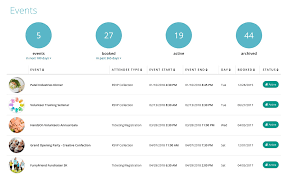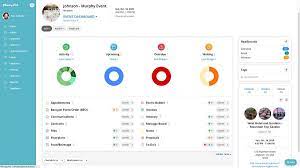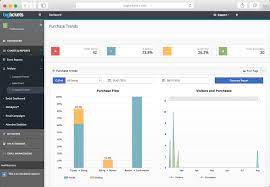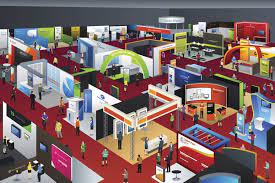Conference Center Management Software: Streamlining Efficiency and Enhancing Experiences
In today’s fast-paced world, managing conferences and events requires seamless coordination, efficient planning, and effective communication. This is where conference center management software steps in, revolutionizing the way event venues are operated and making the entire process smoother for organizers and attendees alike.
Conference center management software is a comprehensive solution designed to streamline various aspects of event planning, management, and execution. From booking conference rooms to managing registrations, scheduling sessions, handling logistics, and generating reports – this software simplifies it all.
One of the key benefits of utilizing conference center management software is its ability to centralize information. All relevant data, such as room availability, attendee details, session schedules, catering requirements, and more can be accessed from a single platform. This eliminates the need for manual record-keeping and minimizes the risk of errors or miscommunication.
Efficiency is another major advantage offered by this software. By automating repetitive tasks like registration processes or room assignments, event organizers can save valuable time and focus on more strategic aspects of their work. Real-time updates on room availability ensure that double bookings are avoided while optimizing space utilization.
Moreover, conference center management software enhances attendee experiences by providing convenient self-service options. Participants can easily register online, select preferred sessions or workshops based on availability, access event agendas through mobile apps or web portals, and receive real-time notifications about any changes or updates.
For venue managers and administrators, this software provides valuable insights into event performance through analytics and reporting features. They can track attendance numbers, monitor revenue streams generated from different events or services offered within the facility (e.g., catering), identify popular sessions or speakers based on participant feedback surveys – all contributing to data-driven decision-making for future events.
Security is also a key aspect addressed by conference center management software. With secure payment gateways for online registrations and data encryption protocols in place to protect sensitive information, organizers can assure attendees that their personal details are kept safe.
Choosing the right conference center management software is crucial. Consider factors such as scalability, user-friendliness, integration capabilities with other systems (such as CRM or finance software), and ongoing technical support.
In conclusion, conference center management software has become an indispensable tool for modern event venues. By automating processes, centralizing data, and enhancing overall efficiency, it empowers event organizers to deliver exceptional experiences while optimizing their operations. As technology continues to advance, we can expect further innovations in this field to revolutionize the way conferences and events are managed in the future.
9 Tips for Effective Conference Center Management Software Selection
- Research different conference center management software to find the right fit for your organization’s needs.
- Look for a system that is user-friendly and easy to use, so staff members can quickly learn how to use it.
- Choose a software solution with features that will allow you to easily manage bookings, payments, and other administrative tasks related to conferences and events.
- Make sure the software integrates well with other systems you may already be using in order to maximize efficiency and minimize data entry errors.
- Ensure the system provides strong security measures such as encryption and two-factor authentication in order to protect customer data from unauthorized access or theft.
- Check if the system offers automated reminders or notifications for customers regarding their bookings or upcoming events at your conference center, so they don’t miss important updates or deadlines related to their reservations or activities planned there..
- Consider a platform that includes reporting tools which can help you track occupancy rates, analyze performance metrics, and generate useful insights about customer behavior patterns over time..
- Look for an intuitive dashboard interface which makes it easy for staff members to quickly review all upcoming events at a glance..
- Make sure the conference center management software has reliable customer support available in case of any technical issues or questions about using the platform
Research different conference center management software to find the right fit for your organization’s needs.
When it comes to conference center management software, one size does not fit all. To ensure that you find the perfect solution for your organization’s needs, it is essential to research and explore different options available in the market.
The first step in this process is to identify your specific requirements. Consider factors such as the size and nature of your events, the number of attendees you typically handle, the complexity of scheduling sessions or workshops, and any unique features or integrations you may require.
Once you have a clear understanding of your needs, start researching different conference center management software providers. Look for reputable companies with a proven track record in the industry. Read reviews, browse through their websites, and explore their product features and functionalities.
Pay attention to key aspects such as user-friendliness, customization options, scalability, and integration capabilities with other systems you use within your organization. A software that can seamlessly integrate with your existing CRM or finance software can save you time and effort in data management.
Additionally, consider the level of technical support provided by each vendor. Ensure they offer reliable customer service and assistance to address any issues or questions that may arise during implementation or ongoing usage.
Take advantage of free trials or demos offered by software providers. This will allow you to get hands-on experience with the platform and evaluate whether it aligns with your organization’s workflow and meets your expectations.
Furthermore, seek feedback from other professionals in your industry who have experience using conference center management software. Their insights can provide valuable guidance and help narrow down your options.
Remember that investing time in thorough research upfront will pay off in the long run. Finding the right fit for your organization’s needs will not only streamline event management processes but also enhance attendee experiences and improve overall efficiency.
In conclusion, researching different conference center management software solutions is crucial to finding the perfect fit for your organization’s specific requirements. By considering factors such as functionality, scalability, integration capabilities, user-friendliness, and technical support, you can make an informed decision that will contribute to successful event management.
Look for a system that is user-friendly and easy to use, so staff members can quickly learn how to use it.
When it comes to selecting conference center management software, one crucial tip to keep in mind is to look for a system that is user-friendly and easy to use. The success of any software implementation depends on how quickly and efficiently staff members can adapt to it.
A user-friendly conference center management software ensures that your team can quickly learn how to navigate its features and functionalities without extensive training or technical expertise. This saves valuable time and resources that would otherwise be spent on lengthy onboarding processes.
By opting for an intuitive system, staff members can easily grasp the software’s interface, understand its workflows, and perform tasks with minimal effort. This reduces the learning curve and allows them to focus on their core responsibilities rather than struggling with complex software.
Furthermore, a user-friendly conference center management software promotes efficiency within your organization. Staff members can swiftly access information, update event details, manage bookings, generate reports, and handle other essential tasks without getting bogged down by complicated procedures or confusing interfaces.
The benefits of choosing a user-friendly system extend beyond initial implementation. As staff members become proficient in using the software, they will be able to maximize its potential and leverage advanced features effectively. This leads to improved productivity, streamlined processes, and enhanced overall performance.
During the selection process, consider requesting demos or trial periods from different vendors. This allows you to assess firsthand how intuitive their systems are and how well they align with your team’s needs. Additionally, seek feedback from potential users within your organization who will be directly interacting with the software regularly.
In summary, prioritizing a user-friendly conference center management software is crucial for ensuring smooth implementation and optimal utilization of its capabilities. By choosing a system that is easy to use, you empower your staff members to quickly adapt to the new technology and focus on delivering exceptional event experiences without unnecessary complications or delays.
Choose a software solution with features that will allow you to easily manage bookings, payments, and other administrative tasks related to conferences and events.
Choosing a Conference Center Management Software: Simplify Bookings, Payments, and Administrative Tasks
When it comes to managing conferences and events, having the right software solution can make all the difference. One important tip to keep in mind is to choose a conference center management software that offers features specifically designed to streamline bookings, payments, and other administrative tasks.
Efficiently managing bookings is crucial for any conference or event venue. Look for software that provides a user-friendly interface for creating and updating event schedules, assigning rooms or spaces, and checking availability in real-time. The ability to easily manage bookings ensures smooth operations and minimizes the risk of double bookings or scheduling conflicts.
Payments are another critical aspect of conference center management. Opt for software that offers secure payment gateways and supports multiple payment options such as credit cards or online transfers. This allows attendees to conveniently register and pay for their participation while ensuring their financial information remains protected.
Administrative tasks can often be time-consuming and complex. Seek out software solutions that provide intuitive dashboards or interfaces where you can effortlessly handle tasks like generating invoices, tracking payments received, managing attendee registrations, sending automated reminders or confirmations, and producing comprehensive reports.
Additionally, consider software that offers integration capabilities with other systems you may already use in your organization. For example, syncing your conference center management software with a customer relationship management (CRM) system can help streamline communication with attendees before, during, and after the event.
By choosing a conference center management software with these essential features, you can simplify the entire process of managing conferences and events. From handling bookings efficiently to facilitating secure payments and automating administrative tasks – this software becomes an invaluable tool in ensuring successful events while saving time and effort.
Remember to carefully evaluate different software options based on your specific needs before making a decision. Look for user-friendly interfaces, robust security measures, seamless payment processing capabilities, integration possibilities with other systems if required – all contributing to a smooth and hassle-free conference management experience.
Investing in the right conference center management software will not only enhance your operational efficiency but also improve attendee satisfaction, leading to successful and memorable events.
Make sure the software integrates well with other systems you may already be using in order to maximize efficiency and minimize data entry errors.
When it comes to choosing conference center management software, one important tip to keep in mind is to ensure that the software integrates seamlessly with other systems you may already have in place. This integration is crucial for maximizing efficiency and minimizing data entry errors.
Many organizations already utilize various software solutions for different aspects of their operations, such as customer relationship management (CRM), finance, or marketing tools. It is essential that the conference center management software you select can integrate smoothly with these existing systems.
By integrating your conference center management software with other systems, you can eliminate the need for duplicate data entry. This not only saves time but also reduces the risk of errors that may occur when manually transferring information between different platforms.
For example, if your CRM system holds important attendee data, integrating it with your conference center management software allows for seamless transfer of participant information during registration. This ensures accurate and up-to-date records without the need for manual input.
Additionally, integration enables better coordination and communication between various departments within your organization. For instance, if your finance team uses a separate accounting software, integrating it with your conference center management system can help streamline processes like invoicing and payment reconciliation.
Furthermore, integrated systems provide a holistic view of your operations by consolidating data from different sources. This allows you to generate comprehensive reports and analytics that provide valuable insights into event performance and attendee behavior.
When evaluating conference center management software options, inquire about their integration capabilities. Look for solutions that offer APIs (Application Programming Interfaces) or pre-built integrations with commonly used systems. Ensure that the software provider offers support during the integration process and provides ongoing technical assistance if needed.
In conclusion, selecting a conference center management software that integrates well with your existing systems is key to maximizing efficiency and minimizing data entry errors. By streamlining processes and consolidating information, you can enhance productivity, improve accuracy, and gain a comprehensive overview of your event operations.
Ensure the system provides strong security measures such as encryption and two-factor authentication in order to protect customer data from unauthorized access or theft.
Protecting Customer Data: The Importance of Security Measures in Conference Center Management Software
In an increasingly digital world, the security of customer data has become a top priority for businesses across various industries. When it comes to conference center management software, ensuring strong security measures is crucial to safeguard sensitive information and maintain the trust of attendees and organizers alike.
One essential tip for selecting conference center management software is to prioritize systems that provide robust security features. Encryption and two-factor authentication are two key components that should not be overlooked.
Encryption is a fundamental security measure that converts data into an unreadable format, making it virtually impossible for unauthorized individuals to decipher. By implementing encryption protocols within the software, customer data such as personal details, payment information, and registration records remain protected even in the event of a breach.
Two-factor authentication adds an extra layer of security by requiring users to provide two forms of identification before accessing the system. Typically, this involves entering a password or PIN along with a unique verification code sent to a trusted device or email address. This additional step significantly reduces the risk of unauthorized access, as even if one factor (e.g., password) is compromised, the second factor acts as a barrier against potential threats.
By ensuring that your chosen conference center management software offers these security measures, you can be confident in protecting customer data from unauthorized access or theft. This not only safeguards sensitive information but also demonstrates your commitment to maintaining privacy and building trust with your clients.
When evaluating different software options, inquire about their security protocols and certifications. Look for industry-standard encryption algorithms (such as AES-256) and check if they comply with relevant data protection regulations (e.g., GDPR or CCPA). Additionally, consider whether the software provider regularly updates their system to address emerging threats and vulnerabilities.
Remember that investing in robust security measures is not only essential for protecting customer data but also mitigating potential legal and reputational risks for your business. Prioritizing security in conference center management software ensures that your attendees can confidently share their information and engage in your events without concerns about data breaches or identity theft.
In conclusion, when selecting conference center management software, make sure to prioritize security features such as encryption and two-factor authentication. By doing so, you can protect customer data from unauthorized access or theft, build trust with your clients, and ensure the overall success of your events.
Check if the system offers automated reminders or notifications for customers regarding their bookings or upcoming events at your conference center, so they don’t miss important updates or deadlines related to their reservations or activities planned there..
Enhance Customer Experience with Automated Reminders: A Must-Have Feature in Conference Center Management Software
When it comes to managing a conference center, ensuring a seamless experience for customers is paramount. One essential feature to look for in your conference center management software is automated reminders or notifications for customers. This feature can significantly improve customer satisfaction by keeping them informed and engaged throughout their journey with your venue.
Automated reminders play a vital role in ensuring that customers don’t miss important updates or deadlines related to their bookings or upcoming events at your conference center. By sending timely notifications, such as reservation confirmations, payment reminders, session schedules, or last-minute changes, you help attendees stay organized and fully prepared.
Imagine a scenario where an attendee has booked a conference room for an important meeting but forgets about it until the last moment. Without automated reminders, they might miss the event entirely, causing frustration and potentially damaging their perception of your venue’s reliability.
By incorporating automated reminders into your conference center management software, you can proactively keep customers engaged and informed. Whether it’s sending out pre-event details like parking instructions or providing updates on any modifications to the event schedule, these reminders ensure that attendees are well-informed every step of the way.
Moreover, personalized notifications can be sent based on individual preferences or specific activities planned at the conference center. For instance, if an attendee has signed up for a workshop or requested additional services like catering, automated reminders can be tailored to remind them of these specific details.
The benefits extend beyond customer satisfaction. Automated reminders also reduce administrative burdens by minimizing the need for manual follow-ups and communication efforts. This allows your team to focus on more strategic tasks while maintaining effective communication with customers effortlessly.
When selecting conference center management software, make sure that the system offers robust notification capabilities. Look for features such as customizable templates, multiple delivery channels (email/SMS/push notifications), and scheduling options to cater to different customer preferences.
In today’s digital era, where attention spans are shorter than ever, automated reminders have become an essential tool for conference centers. By leveraging this feature in your management software, you can enhance customer experiences, reduce no-shows, and ensure that attendees are well-prepared and engaged throughout their journey with your venue.
Consider a platform that includes reporting tools which can help you track occupancy rates, analyze performance metrics, and generate useful insights about customer behavior patterns over time..
When it comes to selecting the right conference center management software, one crucial tip is to consider a platform that includes robust reporting tools. These tools can provide valuable insights into your venue’s performance, helping you make data-driven decisions and improve customer experiences.
Tracking occupancy rates is essential for any event venue. With reporting tools, you can easily monitor how well your conference rooms are utilized over time. By analyzing occupancy data, you can identify peak periods and optimize your scheduling accordingly, ensuring maximum utilization of your space.
Performance metrics are another crucial aspect to consider. Reporting tools allow you to track key performance indicators such as revenue generated from different events or services offered within your facility. By analyzing these metrics, you can identify which events or services are most profitable and make informed decisions about resource allocation and pricing strategies.
Additionally, reporting tools can help you gain valuable insights into customer behavior patterns over time. By analyzing attendee data and feedback, you can understand attendee preferences, identify popular sessions or speakers, and tailor future events to better meet their needs. This not only enhances the overall attendee experience but also helps build stronger relationships with your customers.
Having access to comprehensive reports generated by the software simplifies the process of presenting information to stakeholders or potential clients. You can showcase occupancy rates, revenue growth trends, or customer satisfaction ratings in a visually appealing and easily understandable format.
By considering a conference center management software platform that includes robust reporting tools, you empower yourself with the ability to make informed decisions based on real-time data. This not only improves operational efficiency but also helps drive business growth by delivering exceptional experiences that cater precisely to your customers’ needs and preferences.
Look for an intuitive dashboard interface which makes it easy for staff members to quickly review all upcoming events at a glance..
When it comes to conference center management software, one essential tip to keep in mind is to look for an intuitive dashboard interface. This feature allows staff members to efficiently review all upcoming events at a glance, saving time and ensuring seamless coordination.
An intuitive dashboard provides a comprehensive overview of the event schedule, allowing staff members to quickly access vital information such as event dates, room assignments, session details, and attendee numbers. With a simple and visually appealing interface, navigating through the software becomes effortless.
By having all important details readily available on the dashboard, staff members can easily identify any scheduling conflicts or overlapping sessions. This enables them to proactively resolve issues and make necessary adjustments without delay.
Furthermore, an intuitive dashboard promotes effective communication among team members. With a quick glance at the interface, everyone involved in event management can stay informed about upcoming tasks and deadlines. This ensures that everyone is on the same page and can work collaboratively towards a successful event.
The convenience of an intuitive dashboard extends beyond just event management. It also allows staff members to access other important features of the software with ease. Whether it’s generating reports, managing registrations, or handling logistical aspects like catering or audio-visual requirements – everything is just a few clicks away.
In conclusion, when selecting conference center management software, prioritize finding a solution with an intuitive dashboard interface. This feature will empower your staff members by providing them with a clear overview of upcoming events and facilitating efficient coordination. With this tool at their disposal, they can navigate through tasks seamlessly and ensure that every event runs smoothly from start to finish.
Make sure the conference center management software has reliable customer support available in case of any technical issues or questions about using the platform
When it comes to choosing conference center management software, one important tip to keep in mind is to ensure that the software provider offers reliable customer support. Technical issues or questions about using the platform can arise at any time, and having access to prompt assistance can make a significant difference in maintaining smooth operations.
Reliable customer support is crucial for several reasons. First and foremost, it provides peace of mind knowing that help is just a phone call or email away. Whether you encounter a bug in the system, need guidance on a specific feature, or have general inquiries about the software, having a responsive support team available can save you valuable time and prevent potential frustrations.
Furthermore, efficient customer support ensures minimal disruptions during critical moments. Imagine encountering an issue right before a major event or during peak registration periods. With reliable support at your disposal, you can quickly resolve any technical hiccups and continue providing an exceptional experience for both organizers and attendees.
To assess the quality of customer support offered by a conference center management software provider, consider looking into their response times and availability. Do they offer round-the-clock assistance or have specific business hours? How quickly do they typically respond to inquiries? These factors can give you an idea of what to expect in terms of timely resolutions.
Additionally, it’s worth exploring the different channels through which customer support is accessible. Some providers offer live chat options on their website, while others may rely on email or phone communication. Understanding these options will help you determine which method suits your preferences and needs best.
Lastly, don’t hesitate to reach out to existing users or read reviews about the software provider’s customer support services. Hearing about other users’ experiences can provide valuable insights into the level of assistance you can expect.
In conclusion, when selecting conference center management software, prioritize providers that offer reliable customer support. By ensuring access to prompt assistance for technical issues or platform-related questions, you can confidently navigate any challenges that may arise and focus on delivering exceptional events.





